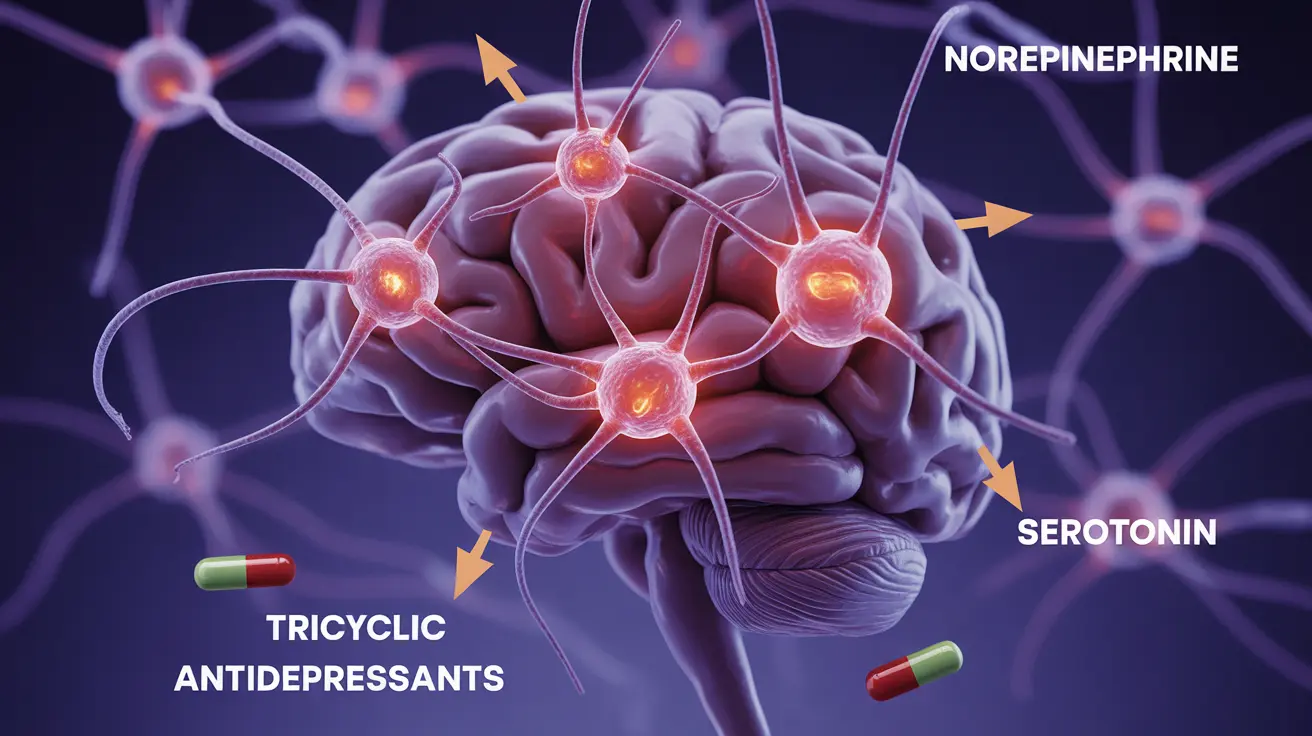Tricyclic antidepressants (TCAs) represent one of the earliest classes of antidepressant medications, playing a significant role in treating various mental health conditions and chronic pain disorders. While newer antidepressants have largely replaced TCAs as first-line treatments, these medications remain valuable therapeutic options for specific patient populations and conditions.
Understanding how TCAs work, their potential benefits, and their side effects is crucial for patients and healthcare providers alike. This comprehensive guide explores the key aspects of tricyclic antidepressants, including their mechanisms, applications, and important safety considerations.
How Tricyclic Antidepressants Work
Tricyclic antidepressants function by increasing the levels of neurotransmitters—specifically norepinephrine and serotonin—in the brain. These chemical messengers play crucial roles in mood regulation, pain perception, and various other bodily functions. TCAs block the reabsorption (reuptake) of these neurotransmitters, allowing them to remain active in the brain for longer periods.
Common Uses and Applications
Depression Treatment
TCAs were originally developed to treat major depressive disorder. They can be particularly effective for patients who haven't responded well to newer antidepressants or those with specific types of depression.
Chronic Pain Management
These medications have shown significant effectiveness in treating various chronic pain conditions, including neuropathic pain and fibromyalgia. The pain-relieving properties often work through different mechanisms than their antidepressant effects.
Migraine Prevention
Some tricyclic antidepressants have proven beneficial in preventing migraine headaches, offering an alternative treatment option for people with frequent migraines.
Side Effects and Management
Common side effects of tricyclic antidepressants include:
- Dry mouth
- Blurred vision
- Constipation
- Weight gain
- Drowsiness
- Dizziness
- Sexual dysfunction
Managing these side effects often involves:
- Starting with lower doses and gradually increasing
- Taking medications at specific times of day
- Regular monitoring by healthcare providers
- Lifestyle modifications to minimize impacts
Safety Considerations and Precautions
TCAs require careful monitoring due to their potential for serious side effects. Patients should be aware of several important safety considerations:
- Regular heart rhythm monitoring may be necessary
- Interactions with other medications must be carefully evaluated
- Alcohol should be avoided while taking TCAs
- Sudden discontinuation can lead to withdrawal symptoms
Comparing TCAs to Newer Antidepressants
While newer antidepressants like SSRIs and SNRIs are generally prescribed first, TCAs may be preferred in certain situations:
- When newer medications haven't been effective
- For specific types of chronic pain
- In cases where the side effect profile is acceptable or even beneficial
- For patients with particular types of depression that respond well to TCAs
Frequently Asked Questions
What are the common side effects of tricyclic antidepressants and how can I manage them?
Common side effects include dry mouth, constipation, blurred vision, and drowsiness. These can be managed by taking medications as prescribed, staying well-hydrated, maintaining good sleep hygiene, and working closely with healthcare providers to adjust dosing if needed.
How do tricyclic antidepressants work to treat depression and other conditions?
TCAs work by blocking the reuptake of neurotransmitters (primarily norepinephrine and serotonin) in the brain, increasing their availability. This helps regulate mood, pain perception, and other bodily functions affected by these chemical messengers.
When are tricyclic antidepressants prescribed instead of newer antidepressants like SSRIs or SNRIs?
TCAs may be prescribed when newer antidepressants haven't been effective, when treating certain types of chronic pain, or when a patient has previously responded well to TCAs. The decision often depends on individual patient factors and specific symptoms.
What are the risks and symptoms of a tricyclic antidepressant overdose?
TCA overdose is serious and can be life-threatening. Symptoms include severe drowsiness, confusion, fast heartbeat, seizures, and unconsciousness. Immediate medical attention is essential if overdose is suspected.
Can tricyclic antidepressants be used safely for chronic pain or migraine prevention?
Yes, TCAs can be used safely for chronic pain and migraine prevention when properly prescribed and monitored. Lower doses are typically used for pain management compared to depression treatment, which may result in fewer side effects.




